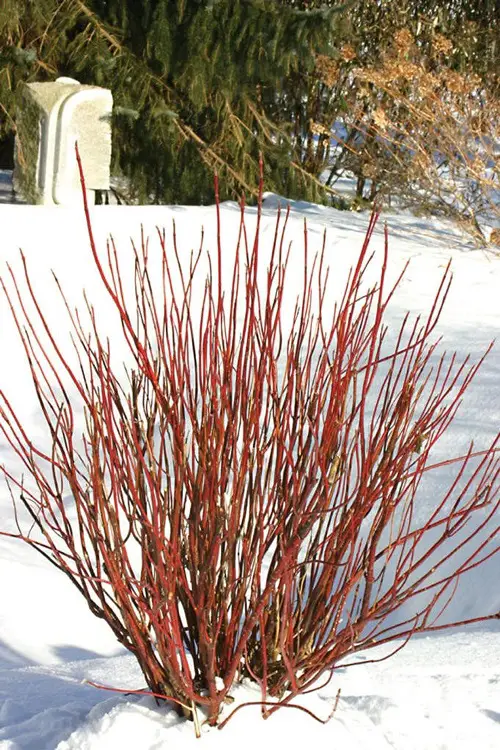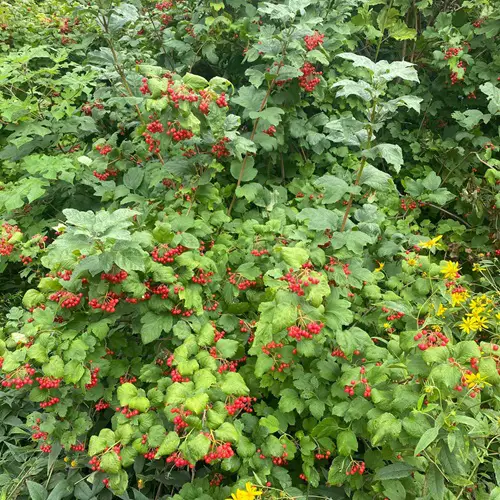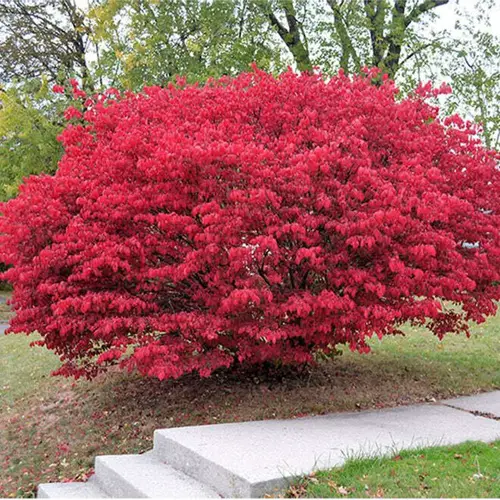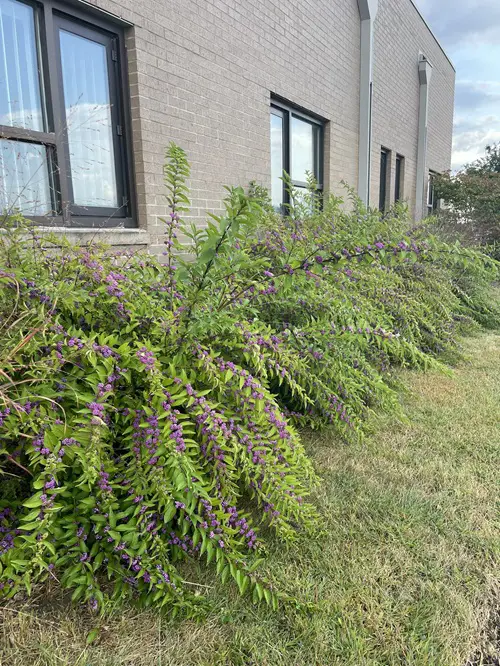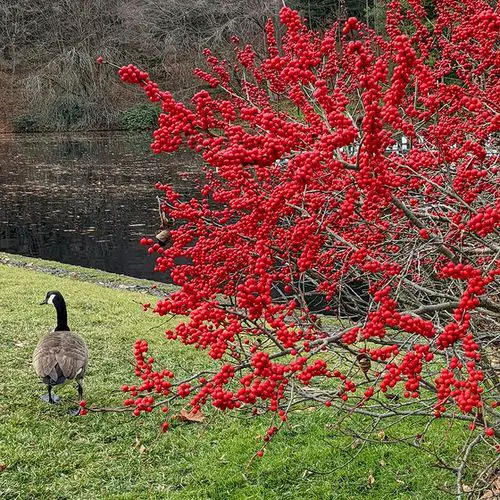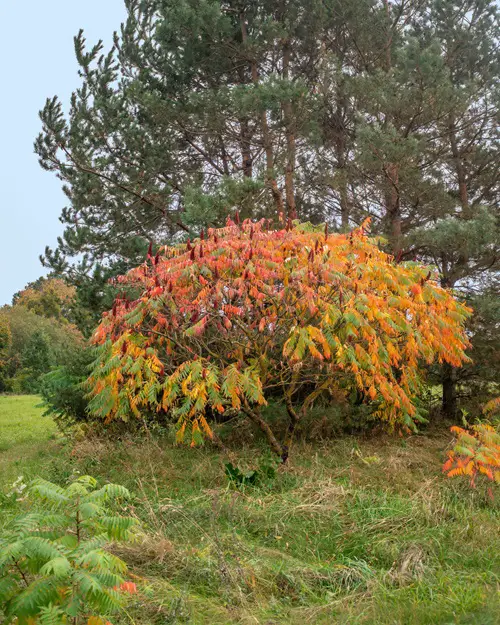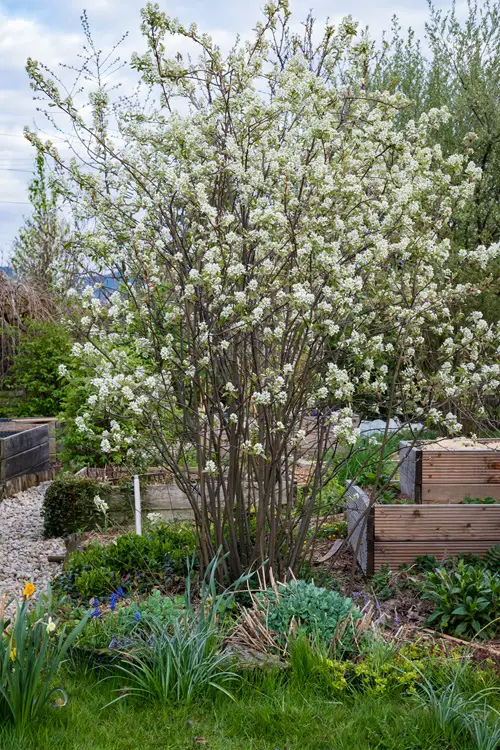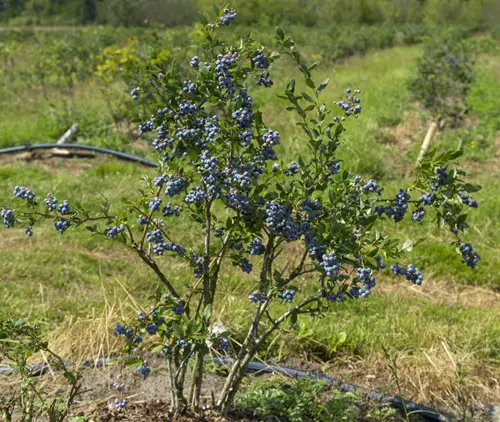Check out our selection of the best Shrubs that Attract Birds All Winter Long and create a lively habitat for them during colder months!
Winter can be a great time to rack up those biodiversity points in your garden! These shrubs attract birds and bring life to your garden during the cold months. They also provide food, nesting spots, warmth, and shelter to many small, wonderful creatures!
Shrubs that Attract Birds All Winter Long
1. Red-Twig Dogwood
Botanical Name: Cornus sericea
USDA Zones: 2-8
Red-twig dogwood stands out in fall and winter with its bright red stems and fiery foliage. Small white flowers blossom in spring, followed by blue-tinged white berries that last through fall—a crucial food source for songbirds.
This North American native wild plant is also a larval host to butterflies and bees, making it perfect for a pollinator or butterfly garden. It can grow up to eight feet and thrives in full to partial sun and moist, well-draining soil. Check out these landscaping ideas with the shrub.
2. Eastern Red Cedar
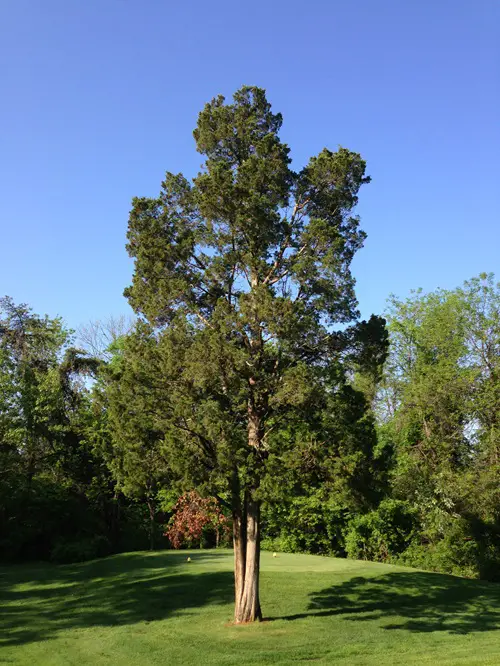
Botanical Name: Juniperus virginiana
USDA Zones: 2-9
Touted as the “tree for birds,” eastern red cedar produces bluish-black berries in fall and winter that cedar waxwings flock to in huge numbers and devour, outnumbering other small birds and mammals!
This essential native North American wildlife tree is also a favorite nesting spot for sparrows, robins, mockingbirds, myrtle warblers, and juncos. It’s a drought-tolerant, evergreen winter tree that thrives in rich, loamy, well-draining, consistently moist soil.
3. American Cranberry Viburnum
Botanical Name: Viburnum opulus var. americanum
USDA Zones: 2-7
The American cranberry bush viburnum produces white spring flowers and bitter burgundy berries in fall—a staple winter food for ruffed grouse, pheasants, and songbirds! And humans find it tarty but love it for a sauce or preserve.
This native shrub also acts as a cover plant for birds and small mammals and is useful as a border or hedge to prevent erosion and runoff from wind and rain.
4. Chokeberry
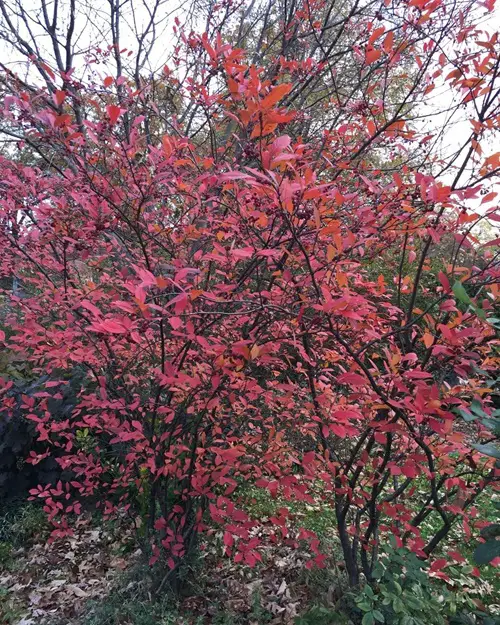
Botanical Name: Aronia arbutifolia
USDA Zones: 3-9
This native North American shrub produces bitter berries that turn sweet as they ferment through winter, making them more palatable for spring migratory birds to feed on. Red chokeberries are sweeter than black ones and can be made into jams and jellies.
Pink and white blossoms filled with nectar appear in spring, attracting butterflies and pollinators, making it a great choice for a native winter garden. Perfect for hedges and mass plantings, the shrub spreads by sending up new shoots and can reach 10 feet tall!
5. Wahoo
Botanical Name: Euonymus atropurpureus
USDA Zones: 3-8
Native to central and eastern United States, this rapid-growing shrub pushes out humble lavender blooms in spring that lure bees to its nectar. But these flowers are quickly replaced with seed capsules that split open to reveal fleshy, red fruits.
These fruits are winter staples for birds like Northern flicker, catbirds, and bluebirds. Also known as a burning bush, its leaves turn gold and burgundy in the fall! It grows well in a sunny, moist spot.
6. American Beautyberry
Botanical Name: Callicarpa americana
USDA Zones: 5-8
This Native American perennial shrub is a crucial food source for over 40 species of songbirds, including American robins and purple finches. Traditionally considered medicinal, this hardy plant produces clusters of purple berries in the fall.
With graceful arching branches, this hardy shrub can even tolerate fire. However, it doesn’t like deep shade or being crowded. For better, juicier berries, give it more sun and plant it in a bright east-facing spot.
7. Winterberry
Botanical Name: Ilex verticillata
USDA Zones: 3-9
A key bird community in North Carolina describes winterberries as “irresistible to birds and people,” and we have to agree! Winterberries may go unnoticed in summer, but they grab attention in the fall when their leaves drop, and bright red berries emerge.
From the threatened Wood Thrush to catbirds, robins, bluebirds, and woodpeckers, all flock with equal joy to feast on the scarlet berries of this native plant. Ideal as hedges in pollinator gardens, winterberry flourishes in full to partial sun with well-drained soil.
8. Crabapple
Botanical Name: Malus
USDA Zones: 4-8
Producing peachy pink blooms in spring and sunny edible fruits in the fall, these pretty, rounded trees attract several birds, including robins, finches, cardinals, cedar waxwings, and bluebirds. Birds even come to feed on insects drawn to their nectar-filled flowers!
Crabapples flourish in full sun and moist, well-drained soil. They live for many years and can grow up to 26 feet!
9. Staghorn Sumac
Botanical Name: Rhus typhina
USDA Zones: 3-9
Staghorn sumac is a fast-growing shrub native to parts of North America. Its fern-like leaves turn bright red in the fall, and clusters of fuzzy, dark red berries stay on through winter, feeding birds like robins and vireos.
Since staghorn sumac spreads quickly, it may take over more space than most gardens allow, so don’t be shy about pruning it.
10. Serviceberry
Botanical Name: Amelanchier
USDA Zones: 4-9
Attracting over 35 species of birds, including the declining Baltimore oriole, this multitrunked shrub produces delicious edible berries in blue and blackish red and star-shaped white blooms in spring.
Highly resilient and drought-tolerant, grow this as an accent or border plant in an edible garden.
11. Bunchberry
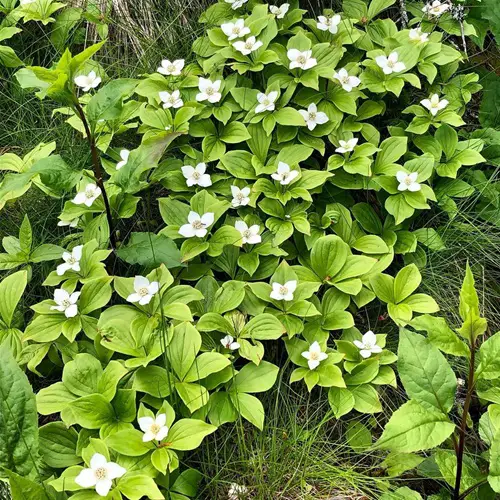
Botanical Name: Cornus canadensis
USDA Zones: 2-7
This wildflower grows in North American mixed wood forests. In the fall, its burgundy berries are a food source for several song and game birds, such as ruffed grouse, white-throated sparrows, and veeries.
With a creeping form, this shrub flourishes in dappled sunshine and organic-rich, well-draining, acidic soil.
12. Rose

Botanical Name: Rosa
USDA Zones: 5-11
And sometimes, all you need is a simple, elegant rose to beckon the birds and bees to your garden! Rose hips are its fruits, eaten by blackbirds, thrushes, redwings, and finches. They also feed on the insects and caterpillars that feed on this classic flowering shrub!
Hips appear on nearly all types of roses, including heirloom, climbing, groundcover, and tea roses, especially the popular Rosa canina.
13. Firethorn
Botanical Name: Pyracantha coccinea
USDA Zones: 6-9
This evergreen shrub’s thick, thorny branches make great winter shelter and nesting spots for wildlife. As fall arrives, the branches crowd with bright red-orange berries, which birds like thrushes and blackbirds love!
Producing white summer blooms, this drought-tolerant shrub is perfect for hedges and privacy screening—even the most prying eyes cannot get through its thick, thorny foliage!
14. Cranberry Cotoneaster
Botanical Name: Cotoneaster apiculatus
USDA Zones: 4-7
Cranberry cotoneaster is a low, arching shrub with shiny leaves and red berries that last till around Christmas but are devoured by songbirds, fieldfares, waxwings, and redwings soon after!
They are perfect for slopes and terraces, have a compact, upright growth habit, and can be used as lush, low-growing ground covers or even hedges.
15. American Elderberry
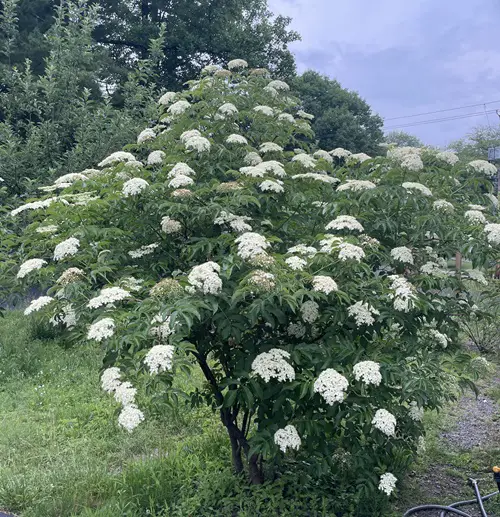
Botanical Name: Sambucus canadensis
USDA Zones: 3-9
Elderberry—native to North America, Venezuela, and Brazil—grows in thick clusters that provide excellent shelter and nesting spots for many birds. In the US, this shrub thrives in Ohio and produces large, creamy flowers the size of dinner plates.
They are known for attracting American goldfinches, Baltimore orioles, and Eastern bluebirds to gardens.
16. Nannyberry
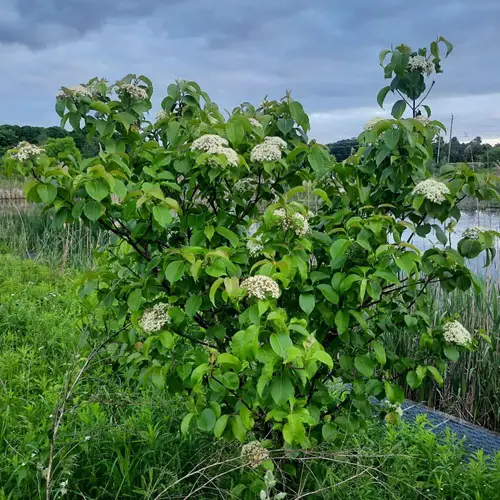
Botanical Name: Viburnum lentago
USDA Zones: 3-7
Nannyberry is a native shrub or small tree with shiny, dark green leaves and clusters of berries hanging in early fall. The berries turn blue-black and stay on through winter, providing food for many birds.
You can trim nannyberry to make a hedge or grow it at the back of a garden bed. It thrives in well-draining, moist soil with a neutral pH and bright sunshine.
17. Arrowwood Viburnum
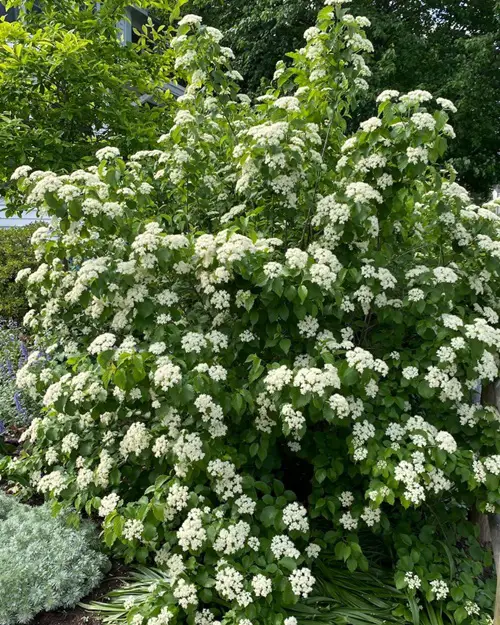
Botanical Name: Viburnum dentatum
USDA Zones: 3-8
Native to eastern parts of the United States, arrowwood is a hardy, adaptable shrub that makes for the perfect bird shelter in winter. With clusters of creamy white summer flowers, it produces blue-black berries by fall, loved by birds, bees, and small mammals alike.
When growing viburnums, apply a 3-4 inch layer of mulch around the root system to retain moisture and insulate the roots. They’re also ideal shrubs for winter interest.
18. Highbush Blueberry
Botanical Name: Vaccinium corymbosum
USDA Zones: 3-9
Sweet, juicy blueberries barely need an introduction, but we can perhaps introduce a few of its lesser-known feathery visitors who love these fruits as much as we do! Bluebirds, mockingbirds, cardinals, robins, and catbirds are just a few names to get you started.
Thriving in full to partial sun, highbush blueberry varieties prefer slightly acidic soil; consider growing these shrubs alongside acid-loving flowering plants like azaleas and rhododendrons!
19. Pagoda Dogwood
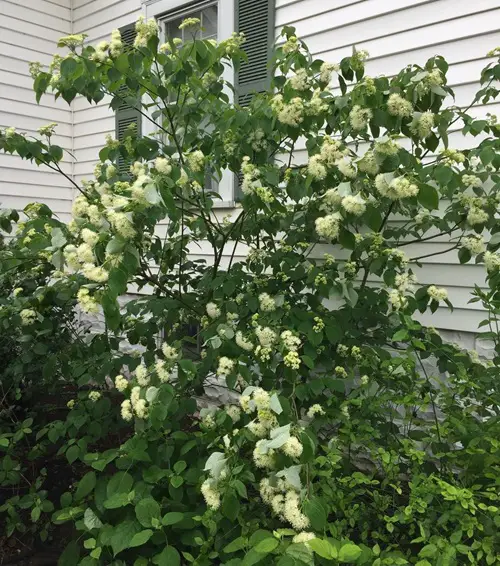
Botanical Name: Cornus alternifolia
USDA Zones: 3-7
Many backyard birds, like downy woodpeckers, brown thrashers, and eastern bluebirds, are drawn to the dark fruits of the pagoda dogwood. This small tree grows best at the edges of wooded areas or shady gardens.
It has unique, horizontal branches and creamy white flowers that bloom above the leaves in spring.
20. Hawthorn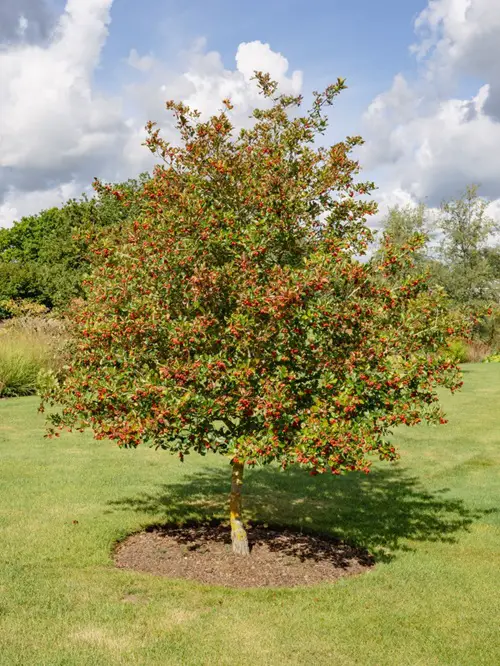
Botanical Name: Crataegus
USDA Zones: 4-8
Another fertile feast for birds, hawthorn produces glossy red berries that last through winter, providing food for birds like robins, finches, waxwings, mockingbirds, and even wild turkeys! However, this shrub takes 5-8 years to bear fruits when grown from seed.
Native to North Carolina, hawthorns thrive in full sun and prefer well-draining, moist soil of varying pH levels.


